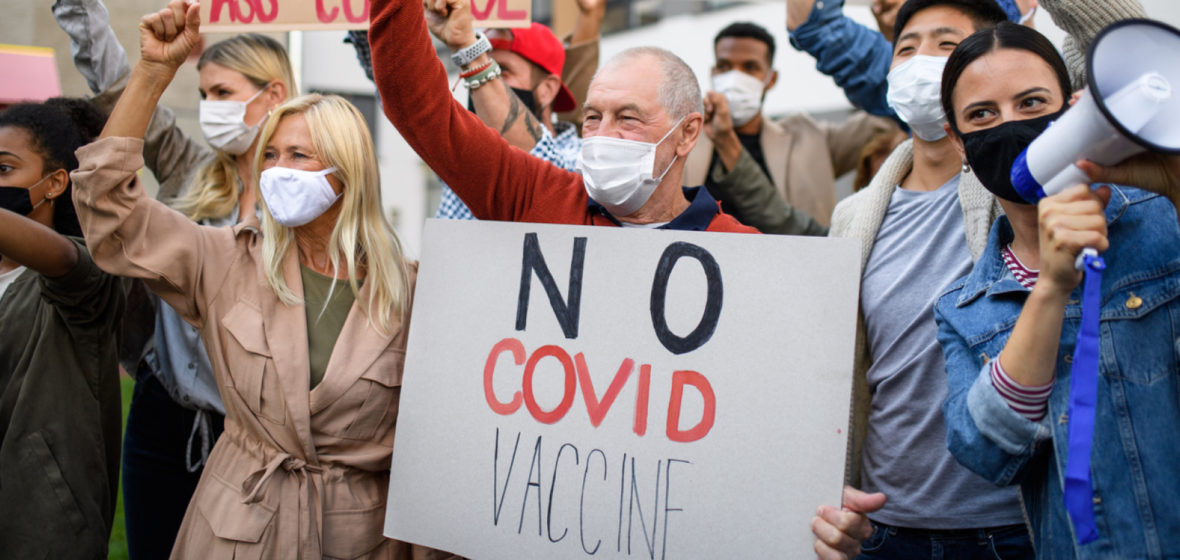Snapshot
- Four recent decisions have received significant publicity regarding the requirements for people to be vaccinated.
- The Full Bench of the Fair Work Commission determined that it can look behind a medical contraindication certificate to determine whether it certifies an actual exemption from a mandatory vaccination requirement.
- The Supreme Court of NSW has dismissed two claims that public health orders requiring COVID-19 vaccinations for certain categories of workers were invalid.
- The Supreme Court of NSW has also dismissed a claim that public health orders authorising police to require persons to provide evidence of their name, address and vaccine status were invalid.
The October 2021 edition of the LSJ included the Legal Update Mandatory Covid-19 Vaccinations – Are they lawful? Since that article was published, four decisions have received significant publicity concerning the requirements for people to be vaccinated. This article summarises each of those decisions.
Full Bench of the Fair Work Commission – Jennifer Kimber v Sapphire Coast Community Aged Care [2021] FWCFB 6015
In this matter, a Full Bench of the Fair Work Commission took the opportunity to provide its views on the mandating of influenza and COVID-19 vaccinations under public health orders and what requirements must be met by an employee asserting they cannot become vaccinated due to a medical contraindication. The minority, dissenting decision has received significant publicity and scrutiny.
Jennifer Kimber had most recently been employed as a receptionist by Sapphire Coast Community Aged Care and had been employed since April 2013. In June 2020, a public health order was issued in NSW, which required all employees to be vaccinated against influenza in order to be able to enter or remain on the premises of a residential aged care facility, unless an employee was able to present a medical contraindication certificate issued by a medical practitioner.
Due to that public health order, Sapphire Coast mandated influenza vaccinations for all of its employees, unless the employee had a specific medical exemption supported by evidence, and notified all of its employees of its decision. In response, Ms Kimber initially provided Sapphire Coast with a letter from a practitioner in Chinese medicine, who stated that Ms Kimber would prefer not to be vaccinated and that she was prescribing her with immune boosting and antiviral herbs instead.
Sapphire Coast did not consider that Ms Kimber had a proper basis to refuse the influenza vaccination, and stood Ms Kimber down from her employment. Ms Kimber subsequently provided a letter of support from her doctor stating that she had a severe allergic reaction to the influenza shot in the past and had been advised not to have it again. Ms Kimber then commenced a period of paid leave, indicating that she would like to wait and see whether the vaccination requirement may change.
Ms Kimber subsequently provided a further letter of support from her doctor, which provided more specific details in relation to her alleged severe allergic
reaction, together with two undated photos showing the reaction which was said to have occurred. In addition, the doctor completed a medical contraindication certificate, but importantly did not indicate any of the specific contraindications listed on the form, instead completing the ‘other’ box and referencing severe facial swelling and a lasting rash.
After having sought to re-enter the workplace in contravention of the public health order, Ms Kimber was invited to show cause why her employment should not be terminated. Sapphire Coast then terminated Ms Kimber’s employment on the basis that without being vaccinated against influenza, she could not fulfil the inherent requirements of her role. Ms Kimber subsequently filed an application for unfair dismissal in the Fair Work Commission (‘FWC’).
At first instance ([2021] FWC 1818), the Commission supported Sapphire Coast’s decision and found that the termination of Ms Kimber’s employment was not harsh, unjust or unreasonable. The Commissioner found there was not sufficient evidence to support a finding that Ms Kimber had previously suffered some form of adverse reaction to the influenza vaccination and that Sapphire Coast had taken ‘an objectively prudent and appropriate approach’ in dealing with these issues. Ms Kimber sought to appeal this decision.
The FWC may only grant permission to appeal an unfair dismissal decision where it considers that it would be in the public interest to do so. The majority of the Full Bench determined that it was not appropriate to grant permission to appeal and made a number of significant observations including:
- Under the public health order, it is not sufficient that a medical contraindication certificate is signed by a medical practitioner, but rather the medical practitioner must certify that the employee actually has what is, in objective terms, a medical contraindication to the vaccination;
- There was a real doubt as to the credibility of Ms Kimber’s assertion that she objected to taking the influenza vaccine because of a previous allergic reaction. This doubt arose as a result of Ms Kimber not previously seeking any medical treatment, the lack of any reference to a previous adverse reaction in her initial correspondence, that she failed to report or disclose any adverse reaction until after she was stood down from her employment, and what the majority perceived to be Ms Kimber’s general anti-vaccination position;
- Ms Kimber’s stated unwillingness to take the COVID-19 vaccine supported the inference that she held a general anti-vaccination position. As a result, this pointed to the lack of utility in the FWC granting permission to appeal, as there could be no possibility of Ms Kimber receiving reinstatement into her role without taking that vaccination in light of subsequent public health orders; and
- The majority did not consider it to be in the public interest to permit the appeal, on the basis that it did not intend, in the circumstances of the current COVID-19 pandemic, to give any encouragement to ‘a spurious objection to a lawful workplace vaccination requirement’.
The dissenting member stated that they had never more strenuously disagreed with an outcome in an unfair dismissal matter and that the decision at first instance manifested a serious injustice to Ms Kimber that required remedy.
The dissenting member found there was no reasonable and lawful direction given by Sapphire Coast to Ms Kimber, and that there could not be one in circumstances where Ms Kimber had a valid exemption. The member held it was not open to Sapphire Coast to form the view that the medical contraindication certificate completed on Ms Kimber’s behalf did not come within the relevant exemption, or make their own diagnosis, or form their own view as to whether or not the reasons given on the form were valid. The member took the view that all that was required for Ms Kimber to come within the exemption from vaccination was to provide a valid, completed medical contraindication certificate.
The member concluded their dissenting decision by making some strong statements about Australia’s COVID-19 strategy, stating that:
‘The statements by politicians that those who are not vaccinated are a threat to public health and should be “locked out of society” and denied the ability to work are not measures to protect public health. They are not about public health and not justified because they do not address the actual risk of COVID. These measures can only be about punishing those who choose not to be vaccinated. If the purpose of the PHOs is genuinely to reduce the spread of COVID, there is no basis for locking out people who do not have COVID, which is easily established by a rapid antigen test. Conversely, a vaccinated person who contracts COVID should be required to isolate until such time as they have recovered.
Blanket rules, such as mandating vaccinations for everyone across a whole profession or industry regardless of the actual risk, fail the tests of proportionality, necessity and reasonableness. It is more than the absolute minimum necessary to combat the crisis and cannot be justified on health grounds. It is a lazy and fundamentally flawed approach to risk management and should be soundly rejected by courts when challenged.
All Australians should vigorously oppose the introduction of a system of medical apartheid and segregation in Australia. It is an abhorrent concept and is morally and ethically wrong, and the anthesis of our democratic way of life and everything we value.
Australians should also vigorously oppose the ongoing censorship of any views that question the current policies regarding COVID. Science is no longer science if… a person is not allowed to question it.
Finally, all Australians, including those who hold or are suspected of holding “anti-vaccination sentiments”, are entitled to the protection of our laws, including the protections afforded by the Fair Work Act. In this regard, one can only hope that the Majority Decision is recognised as an anomaly and not followed by others’ (at [179]–[184]).
Although this dissenting decision has provided an alternate view in respect of mandating vaccinations in the workplace, those views are inconsistent with the majority in Kimber v Sapphire Coast Community Aged Care, and the recently revised and published positions of the Fair Work Ombudsman, Safe Work Australia, and SafeWork NSW.
On 22 October 2021 Ms Kimber lodged an application for relief under section 39B of the Judiciary Act 1903 (NSW). It has not yet been heard or determined.




